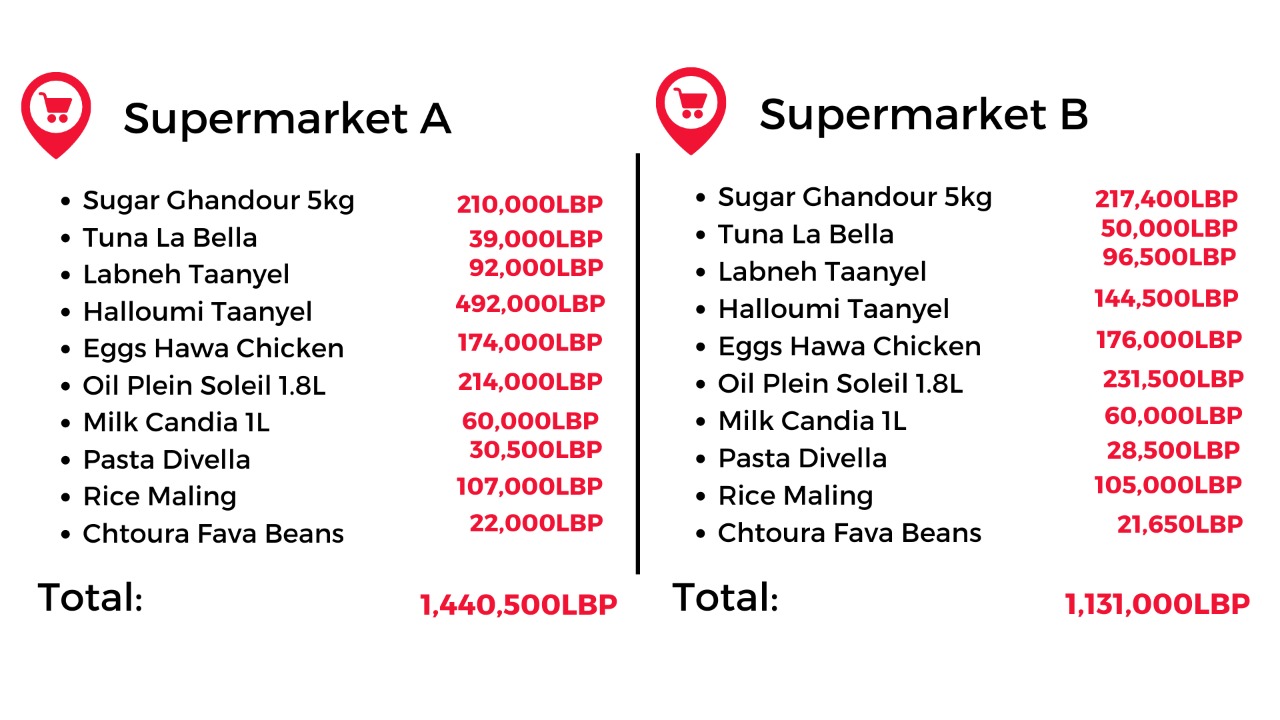
The Extreme Price Variation of Basic Food Commodities Across Markets in Lebanon
Contributors:
Lara Baltaji, Hadi Knaiber, Batoul Ramadan, Abdallah Yahfoufi, Nour Azakir, Herbert Pritzki, Shadi Youssef
Background about the Lebanese Crisis:
For nearly three years now, Lebanon has been facing the most devastating financial crisis in the modern era. The crisis started in October 2019 and aggravated by the economic effects of the COVID-19 pandemic and by the massive Port explosion on August 4, 2020. As a result, the black market dollar exchange of the Lebanese Lira increased from 1515 L.L. (before the crisis) to around 40,000 L.L(today) marking an almost 2500% increase.
You can find below a visual that shows the change of the official LBP/Dollar exchange rate over time until this November 2022.
This huge increase came with countless economic impacts on inflation, unemployment and poverty. Lebanon’s severe crisis which was blamed on the government’s corruption and failure has led to massive impacts on the Lebanese currency causing extreme poverty, unemployment, medicine shortage, electricity shortage, fuel shortage, malnutrition and much more.
You can find below a visual that shows the change of the Food Inflation and the Food Consumer Price Index with the LBP/Dollar Exchange Rate over time until this March 2022.
The huge inflation was directly reflected on the prices of basic food commodities in Lebanon ever since the start of the economic crisis in 2019. What is meant by basic food commodities is the minimum raw agricultural or animal products sufficient to satisfy the nutrition needs of an average household which comprise of:
- Cereals and Tubers (rice, wheat, corn, starch)
- Meat, Fish, Eggs and Seafood
- Dairy (milk, cheese, labne)
- Oil and Fats
- Vegetables and Fruits
- Sugar and Salt
The slope of increase before 2021, however, was quite subtle due to the fact that food commodities were subsidised by the government back then. As the Central Bank started to run out of resources to keep the subsidies, the government lifted them in March 2021. That is when the increase in prices of basic food commodities started to follow a much steeper slope.
The below interactive visual shows the change in average prices of food commodities in Lebanon over the years.
Problem:
According to the World Bank, food price fluctuations between Lebanese markets are caused by the Lebanese government’s “deliberately inadequate policy responses”. Due to the inadequate policy responses by the Lebanese government and due to the fact that Lebanon follows a free market economy, the problem of increased food prices started to worsen as not only are prices increasing, but now they are further inconsistent between markets in the different Lebanese regions . This adds an additional overwhelming problem to the many hardships Lebanese people are facing today.
In order to provide evidence for this issue, we decided to visit two supermarkets in Beirut and observe the differences in food prices. The variation in prices of the same food products was absolutely surprising.
The below figure shows the price receipts of the two supermarkets.

Our next step was to explore two datasets issued by World Bank and World Food Programme Price Database. Our data explorations go hand in hand with our observed hypothesis which reveals that “there exist extreme and unexplained variations in food prices around markets in different Lebanese regions”.
The variation in prices of different food commodities has been an existing situation for many years now in Lebanon. This situation has exacerbated ever since the beginning of the economic crisis in 2019 as the price control responses have become inadequate.
The following dashboard shows a comparison of prices of the different food categories between the different Lebanese districts over the years until 2021
The following bar graph shows a comparison of prices of specific food products between the different Lebanese districts over the years until 2022
Below we present the percentage difference of some food products between different Lebanese districts in 2022 (until October):
- The average price of a one kilogram bag of wheat flour in Mount Lebanon was 28,000 LBP whereas in Baabak-El Hermel 10,000 LBP, recording a 95% difference.
- The average price of a 160 gram Akkawi cheese in the South was 60,000 LBP whereas in Akkar 40,000 LBP, recording a 40% difference for cheese.
- The average price of a can of powdered milk (2.5 kg) in Mount Lebanon was 325,000 LBP whereas in Akkar 210,000 LBP, recording a 40% difference for milk.
- The average price of a 3.6 Litre gallon of olive oil in the South was 500,000 LBP whereas in El Nabatieh 430,000 LBP, recording a 15% difference for oil.
And the list of unexplained price variations between districts just keeps growing and growing.
Finally, in order to further prove our hypothesis, we conducted interviews with random Lebanese residents walking on Beirut’s seaside. When asked whether they were noticing price variations between supermarkets, most interviewees agreed that there exist obvious price variations of basic food commodities between different supermarkets. They added that this variation is not related to the location of the markets, for in many cases they have noticed that even markets lying walking steps away from one another vary in food prices. This means that the price variations cannot be explained by the products’ cost of transportation. It is only explained by the fact that there exists no governmental supervision.
Proposed Solution:
In Lebanon, there are laws that protect consumers from monopoly and from overpricing. However, as with many other laws, the government is unable to strongly implement these laws and monitor the prices of the supermarkets especially in the areas that are far from Beirut. For that, we propose a website, which can later be developed into a mobile application. The website shows the official prices of basic food products in the Lebanese market which are regularly updated by the Ministry of Economy whenever a significant change in the LBP exchange rate occurs. It also displays the prices of these same products in different Lebanese supermarkets. This way, Lebanese consumers will be able to check the prices of products before they go shopping, and thus can tell which supermarkets are following the official prices specified by the ministry and which supermarkets are overpriced.
We are working on involving Lebanese consumers in our website. As we all know, the Ministry of Economy has a limited number of employees. Thus they will not be able to monitor the prices in all the Lebanese shops. A better way for monitoring prices in different supermarkets would be to include consumers in the process by giving them the chance to report prices directly on our website. This means that consumers will act as data collectors, and thus can contribute to the success of this project. Now, the ministry will be able to track the overpriced supermarkets and take the necessary measures.
We also hope to develop the website idea into a mobile application, which is a proposition heavily backed by the Ministry of Economy.
Solution Validation:
The application concept we came up with to tackle the problem needed to be validated in order to be put into action. We needed means to check if our ideology could in fact lead to a change in the real world or it is only a theory on a piece of paper.
Therefore, we decided to take the view points of two parties:
- The Lebanese citizens which are the potential future users of our application in order to check if they are actually willing to use it and if it could lead to a change in their lives and to the country in general
- The General Director of the Lebanese Ministry of Economy and Trade, Dr. Mohamad Abou Haidar to assess the practicality and the feasibility of the concept by a professional in the field.
In the streets of Beirut, we went down asking random people about the issue and the proposed solution. All in all, people supported the idea and many claimed that they would be using the application without any doubt and believed that it would make a positive change in the pricing system in Lebanon.
On 25 November 2022, our team visited the director general of the Lebanese Ministry of Economy and Trade, Dr. Mohamad Abou Haidar. We interviewed Dr. Abou Haidar about how practical it is to do such an application and how much it could lead to change and the interview was recorded. Dr. Abou Haidar claimed that this application would lead to a significant change in several aspects. First, this application will help fight corruption in terms of pricings because it will be directly synced to the ministry, so any abnormal pricings will be directly reported to the ministry and the issue will be transferred to the responsible authorities that are able to take any legal action. The ministry also is trying to work on implementing online services that protect consumers’ rights along with the UNDP and other organizations. So, this application will be aligned with the goal of the ministry, since it is online-based. In addition to that, it will play a role in controlling the pricings in the market since it substitutes the need for the huge number of employees and the human resources needed that, no matter how many, cannot roam around the entire supermarkets and stores in all the Lebanese regions. He also said that the complaints of the people will reach the ministry in a more efficient and effective way, because they are via the application and therefore, the ministry can know about the concerns and the issues in a much faster way. Finally, Dr. Mohamad summarized the idea by being a “win-win situation” for both the ministry and the consumers. This is because it will fulfil the needs of the consumers by knowing the exact pricings of the items in any supermarket with a press of a button, will ensure that the rights of the consumers are protected, and will lead to the right selection of the place to be visited. It will also help the ministry in terms of protecting consumers’ rights, censorship and supervision.
Conclusion:
The concept website was presented to the General Director of the Lebanese Ministry of Economy and again, the solution was validated and approved by the ministry by providing us the full support in order to create this website as soon as possible in order to help the people followed by the country in general.
Ending with a future perspective, we believe that this problem is crucial to be solved in the very near future because of the damage it is causing in several aspects ranging from economic, financial to social. We, the people and the ministry have bets that our application concept could be a positive game changer in this issue. Solving this problem marks one of the battles against corruption, and is an attempt to make this country perfect, again.